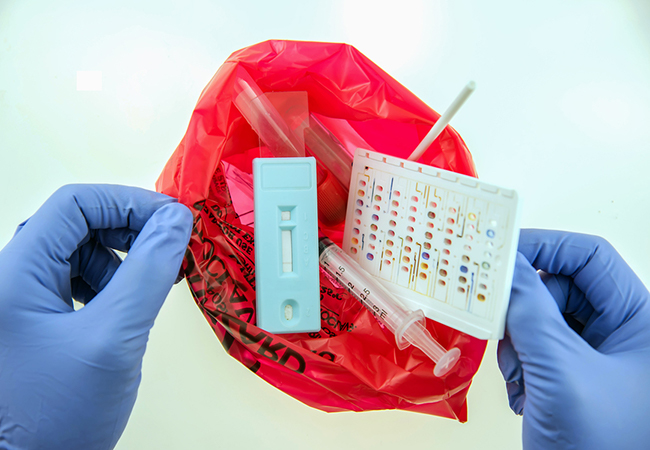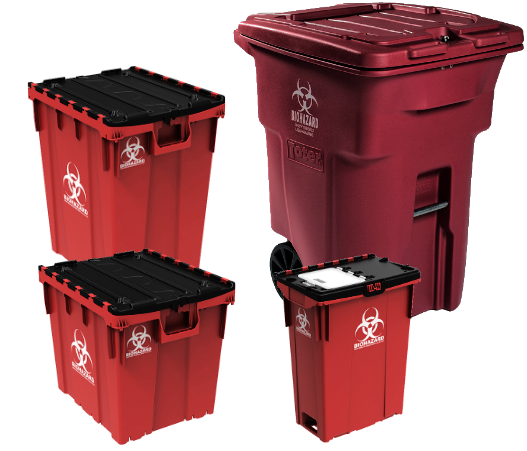Guardians of Cleanliness: Local Medical Waste Removal Service for Your Peace of Mind
Guardians of Cleanliness: Local Medical Waste Removal Service for Your Peace of Mind
Blog Article
Keep Compliant and Safe: Just How to Dispose of Medical Waste Appropriately
In today's ever-changing healthcare landscape, ensuring conformity and safety and security when it involves clinical waste disposal is of utmost significance. The correct management and disposal of clinical waste not just secures the atmosphere but additionally safeguards the wellness and wellness of healthcare employees and the basic public (medical waste disposal services with WasteX). Nonetheless, browsing the complex laws and guidelines bordering medical waste disposal can be a difficult job. In this discussion, we will discover the various sorts of clinical waste, the associated dangers, the lawful requirements, and the very best techniques for maintaining a secure and certified medical waste administration system. Keep tuned to discover the environment-friendly remedies that are transforming the method clinical waste is disposed of, as we clarified this critical aspect of healthcare operations.
Importance of Proper Medical Waste Disposal
Proper clinical garbage disposal is of utmost relevance in making certain the safety and security and health of both medical care employees and the public. Clinical waste, which includes items such as used needles, contaminated dressings, and ran out drugs, postures significant wellness dangers if not dealt with and dealt with correctly.

Furthermore, improper disposal of clinical waste can bring about ecological contamination. When medical waste is not segregated, dealt with, or disposed of appropriately, it can discover its method into landfills or bodies of water, possibly polluting the soil, air, or water sources. This can have detrimental effects on ecological communities and human wellness, as dangerous substances might leach into the setting or be released into the ambience.
Kinds Of Medical Waste and Their Threats
The diverse series of clinical waste generated by medical care facilities presents numerous risks that must be thoroughly dealt with to make sure proper disposal and protect against prospective harm to public health and wellness and the environment. Clinical waste can be classified right into different groups based on its features and level of threat.
One kind of clinical waste is contagious waste, that includes products that are infected with blood or other possibly infectious materials. This can consist of used needles, syringes, and various other sharp objects, in addition to cells, swabs, and dressings from clients with transmittable diseases. Incorrect disposal of infectious waste can result in the transmission of unsafe pathogens and the spread of infections.
One more group is dangerous waste, which consists of products that are harmful, combustible, harsh, or reactive. This can include chemicals, drugs, and particular medical gadgets. Messing up or inappropriate disposal of contaminated materials can lead to ecological contamination and posture risks to the health and wellness of waste employees and the basic public.
Contaminated waste is another type of medical waste that need to be meticulously managed. This waste includes materials which contain contaminated materials, such as made use of radiation therapy sources or contaminated lab materials. Incorrect handling or disposal of contaminated waste can bring about radiation direct exposure and significant health risks.
Lastly, non-hazardous general waste, such as paper, packaging materials, and food waste, is also generated by healthcare facilities. While this waste may not pose significant risks, it still needs to be properly managed to maintain sanitation and protect against the destination of parasites.
To make certain the secure disposal of clinical waste, health care facilities must implement proper partition, transport, storage, and treatment approaches. This includes using appropriate containers, labeling, and training for team, in addition to following local laws and standards. By dealing with the risks linked with different types of clinical waste, health care facilities can shield public health and wellness and the environment.
Lawful and Regulative Requirements for Disposal
In order to ensure the correct and risk-free disposal of clinical waste, health care facilities need to follow legal and regulatory needs. These demands remain in location to protect public health and wellness and the environment from the possible hazards related to clinical waste. Medical waste is identified as a special classification of waste due to its prospective to transmit transmittable illness and have dangerous substances.

Some usual requirements include the segregation and correct product packaging of medical waste, using authorized containers and tags, and the implementation of risk-free handling and transport treatments - medical waste removal. Health care facilities might additionally be called for to keep records of their waste management methods and supply paperwork to governing authorities upon demand
Failing to abide by these regulatory and legal requirements can result in penalties, fines, and reputational damage for healthcare facilities. It is, for that reason, vital for doctor to useful site focus on conformity and develop durable waste administration procedures to make sure the appropriate and safe disposal of medical waste.
Best Practices for Safe Medical Waste Management
Medical care centers need to abide by market best practices to make certain the efficient and risk-free management of clinical waste - medical waste disposal services with WasteX. Applying these finest techniques not only aids safeguard the setting and public health and wellness yet likewise lowers the danger of possible legal and economic consequences
Among the vital finest techniques is the proper partition and control of different sorts of clinical waste. This involves making use of color-coded containers and clearly identifying them to make certain that each kind of waste is thrown away correctly. Furthermore, medical care facilities ought to have marked locations for storage and disposal of medical waste, with clear standards and treatments in position.
Another crucial facet of safe medical waste administration is the training and education and learning of medical care staff. All workers who take care of medical waste must obtain comprehensive training on the appropriate handling, storage, and disposal treatments. It is critical to ensure that team member understand the prospective threats connected with clinical waste and are furnished with the essential understanding and skills to handle it safely.
Regular tracking and discover this auditing of waste management methods is additionally necessary. This involves regularly evaluating waste administration treatments, conducting examinations, and maintaining exact documents. By keeping an eye on waste administration practices, healthcare facilities can identify any kind of potential problems or locations for enhancement and take corrective actions accordingly.
Last but not least, medical care facilities should prioritize using environmentally friendly disposal methods whenever possible. This includes making use of waste therapy technologies such as autoclaving or incineration, which can help in reducing the quantity and harmful nature of medical waste.
Eco-Friendly Solutions for Medical Waste Disposal
Applying eco-friendly remedies for clinical waste disposal is essential for healthcare centers to reduce environmental influence and make sure sustainable practices. Typical techniques of medical garbage disposal, such as incineration and landfilling, have been located to release harmful toxins into the air and infect soil and water resources. Therefore, there is an expanding requirement for different techniques that are both ecologically pleasant and risk-free.
These systems utilize sophisticated technologies to safely refine clinical waste within the healthcare facility itself. By here are the findings treating the waste on-site, transportation exhausts and threats associated with off-site disposal are decreased.
One more green approach is the adoption of recycling programs for specific kinds of clinical waste. Products such as glass, plastics, and steels can be reused as opposed to disposed of in land fills. By implementing segregation and recycling programs, healthcare centers can considerably minimize their waste volume and lessen their ecological impact.
In addition, medical care centers can discover using multiple-use clinical equipment and products. By opting for reusable things, as opposed to single-use choices, the quantity of waste created is substantially minimized. Recyclable products can be disinfected and utilized multiple times, resulting in cost financial savings and much less ecological effect.
Conclusion
Finally, proper disposal of clinical waste is vital for preserving compliance and ensuring safety and security. Recognizing the types of medical waste and their linked dangers is necessary in order to implement the appropriate disposal approaches. Abiding by legal and governing needs is vital for avoiding fines and securing the environment. Adhering to finest practices for secure medical waste monitoring and checking out eco-friendly remedies can add to a lasting and accountable approach to garbage disposal in the health care sector.
In this discussion, we will certainly explore the different kinds of clinical waste, the associated dangers, the lawful requirements, and the best methods for keeping a certified and secure clinical waste management system - medical waste removal service.One kind of clinical waste is transmittable waste, which includes items that are polluted with blood or various other possibly transmittable products.Radioactive waste is another type of medical waste that need to be very carefully taken care of. Clinical waste is classified as a special category of waste due to its potential to transfer contagious illness and consist of unsafe materials
Following best practices for safe clinical waste management and exploring eco-friendly solutions can contribute to a sustainable and liable strategy to throw away disposal in the medical care sector. medical waste disposal services with WasteX.
Report this page